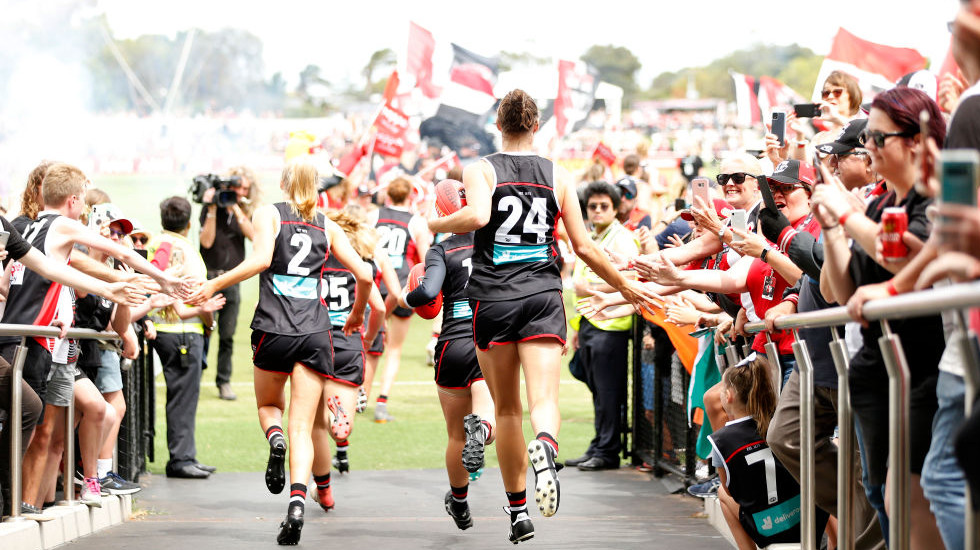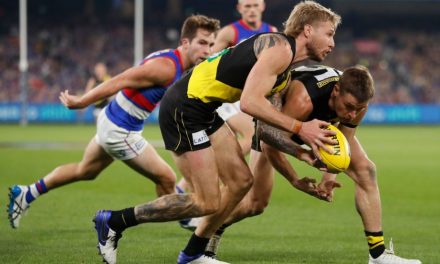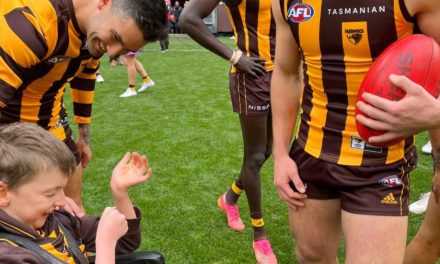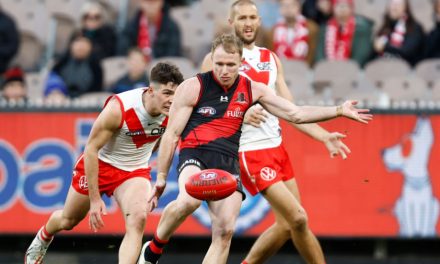St Kilda runs out on to Moorabbin for its first AFL game on Sunday against the Western Bulldogs. Photo: GETTY IMAGES
It’s become an unfortunate reality for AFLW, but the ever so hilarious “lol three goals, didn’t know this was jooniors footy!” brigade are already out in force after week one of the season, no doubt seeking to requite for an underwhelming football career of their own by finding likeminded pessimists to have a good ole’ chuckle at women’s football.
My message to those so eager to extend their arms and reach for that low hanging fruit is quite simply, play the ball, not the woman.
We hear this expression from a young age. It means to “make the main thing, the main thing”.
Don’t get distracted by the inconsequential stuff.
Whether it’s running off the line to shepherd a player instead of taking the onus of picking the ball up yourself, or getting into behind the play blues instead of focusing on beating your man (cough cough, early career Lance Franklin).
As it pertains to AFLW, there is far too much vitriol and blame directed at the players themselves for the current state of the game.
I’m not saying women’s footy is beyond criticism, but to put the onus of the game’s perceived woes on women who are merely taking an opportunity finally available to them is ill-informed at best and downright mean-spirited at worst.
But if you are determined to continue criticising the game on an annual basis (a depressing way to live, but who am I to judge), at least do us the service of directing some of that the way of the governing body itself.
Italian Serie A went from the gold standard in European football to an afterthought on the global stage, and yet oddly enough for that we blame those in charge, not the current batch of players.
WWE “Monday Night Raw” went from a global phenomenon at the turn of the millennium to a show currently averaging roughly one-sixth of its viewership at its peak. For this, we blame management, not the current wrestlers.
Even in the men’s AFL competition, we rightly blame constant rule tinkering, front office intervention and the coaching evolution before we resort to saying “current players suck”.
So where is the benefit of the doubt for the women? Why is it we immediately jump on the attack instead of asking whether they have been put in the best position by the governing body who initiated the league four years ago?
I think there’s some truth that during its initial promotional blitz, the AFL spent too much time attempting to create superstars to build the foundation of the league around whilst not letting people know that this still is a work in progress.
In layman’s terms, the league’s focus was too top-heavy, with style favoured over substance. But this isn’t the fault of the current players.
I think there’s some truth in that AFLW’s expansion to a 14-team competition has perhaps come quicker than the development at the youth level (although extremely promising) can currently facilitate.
This was always going to be the case considering there were more club proposals than competition spots available from the first year of the league.
Expansion was inevitable, regardless of whether the talent pool could produce high quality players from one through to 22. Once again, this isn’t the fault of the current players.
I think there’s truth in the fact the AFL has lowballed the players with their salaries, hence the reason we’re seeing players opt to continue their studies and/or focus on their workplace instead of pursue part-time football as if it were a full-time occupation. Once again, this isn’t the fault of the current players.
A long-winded way of getting here, but simply put, cut them some slack.
We’re still a good five years away from the first wave of draftees who would have grown up watching professional women’s football and playing it as their primary sport through childhood and into adolescence.
Countless AFLW players are transitioning from different sporting backgrounds, and even the game’s best player, Erin Phillips, had to balance football and basketball in a way no other male player has had to do.
By all means, question the AFL, just like we do on a regular basis during the men’s season.
Question whether some decisions are in the best interest of the game or merely an attempt to win the PR war between them and their Super W, NRLW and W-League counterparts.
Question whether they’re doing enough to facilitate the highest-level professionalism among the current playing group.
But don’t question whether a woman should be playing the game just because she took an opportunity that was presented to her arguably 100 years after it should have in the first place.
At the moment, yes, we have low scoring games.
That will change in time, but until then, sit back and enjoy the fact that we have 44 competitors beating the ever living you-know-what out of each other for little scoreboard reward other than the only stat that really matters, the “W” in the win/loss column.
And to quote the single greatest footy music jingle of all time, “that’s what football means to me, that’s what I like my footy to be”.











